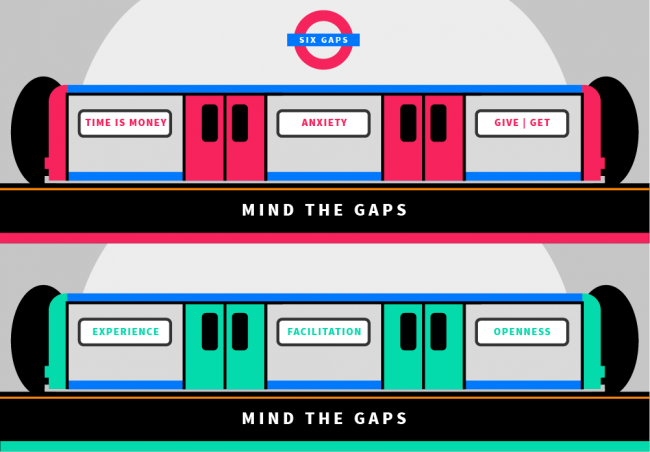Mind the Gap – Part 2

In this previous post, Mind the Gap – Part 1, we shared the top three challenges of collaboration between corporates and start-ups, based on our experience of facilitating many partnerships over the years:
- The Time is Money Gap – Firstly, collaborations fail due to a lack of momentum and unclear objectives. In other words, death by a thousand meetings and conference calls, and fuzzy and moving goalposts.
- The Anxiety Gap – The difference between progress and expectations is known as the anxiety gap, and is especially important due to differing expectations on both sides at different times.
- The Give-Get Gap – Collaboration only happens between equals. However most corporate and start-up collaborations have a huge power imbalance in favour of the larger organisation that ultimately undermine any future partnership.
Since that post was published last year we have been developing our own exciting collaboration with a corporate partner, to create the networks and platforms to truly open up and connect innovators both large and small, from around the world.
Although no longer proceeding with this joint venture, the process has been an invaluable learning experience for us, and has given us the opportunity to reflect more deeply on the challenges of corporate start-up collaboration, described in the following video of a lunchtime lecture given last week at the Open Data Institute.
We had first-hand experience of the Time is Money Gap, as we adjusted to our Corporate partners relatively slow and methodical way of working and were introduced to a steadily increasing number of different stakeholders in the process, while meanwhile they were exposed to our much more reactive, agile processes and our rapidly evolving strategy.
The Anxiety Gap was apparent throughout the process, as we had ongoing discussions with them around strategic fit, cultural alignment and financial return, with an ever-shifting list of priorities and concerns at different stages throughout the process.
We spent many hours in conversation with our partner discussing the reciprocal relationship between the companies, and the potential exchange of skills and experience. We particularly became aware of the Give-Get gap when comparing financial return and cultural innovation, and discussing the value of innovation from a short and long term perspective.
In addition to the three gaps identified in the previous post, there are also three more which all build upon each other as follows:
- The Experience Gap – Having been through the acquisition process with many other companies previously, our Corporate partner had significant experience of the processes, timelines and priorities involved. As a small company, we had no direct previous experience of a deal of this sort, so were by necessity reactive rather than proactive, meaning that we were often a step behind and not in a position to plan ahead or anticipate the next steps
- The Facilitation Gap – Both parties were excited about the potential collaboration, and enthusiasm on both sides meant that lots of different individuals from both organisations were involved in the process. This meant that there was a certain ambiguity around roles and responsibilities, and the process would have been more efficient if there was a facilitator in place to act in the best interests of both parties. This is of course ironic as this is a role that we often play so we understand the value that a neutral broker can provide.
- The Openness Gap – Throughout the process it became clear that there were cultural differences in the level of openness in the two companies, and it would have been helpful for both parties to clarify the mutual approach early on in the process. We engaged in the collaboration with the understanding that we would be co-creating strategy with our Corporate partner, whereas they were expecting us to have a much more autonomous approach. An open discussion at the off-set would ensure that the expectations of both parties were more aligned.
We have certainly learnt a huge amount by going through this process, and will be applying these insights to all future partnerships. The experience has allowed us to eat our own dog food so that we can better understand first-hand the challenges that start-ups and corporates face when collaborating. Through awareness of some of these gaps, we hope that start-ups and corporates can approach potential partnerships with openness and enthusiasm, and can work together to identify each other’s skills and strengths to create healthy and profitable future relationships.
_______________________
This blog post is based on a talk given on 9th March 2018 at the Open Data Institute as part of the ODI Lunchtime Lecture series. See the full video of the talk above and the slides below: